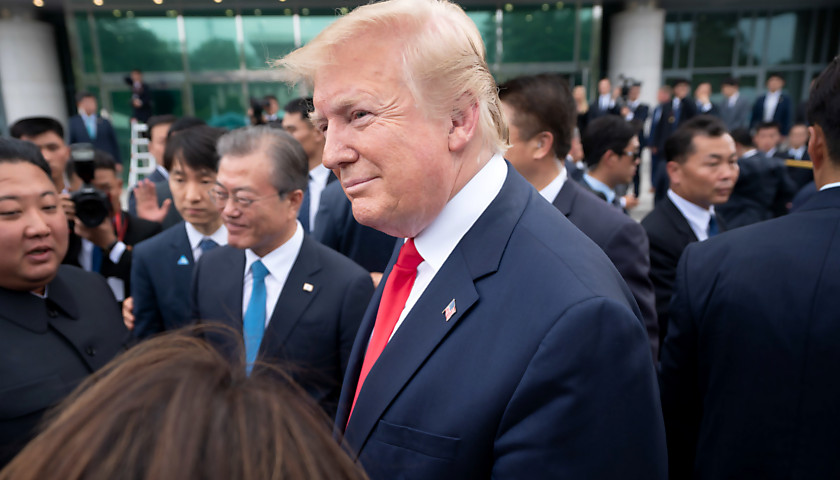by Brandon Weichert
When Donald Trump took office, his predecessor warned him that North Korea was going to be his biggest international headache. Within months of receiving that warning from Barack Obama, the Trump team was faced with escalating nuclear threats from Pyongyang. The world braced as a nuclear standoff appeared to unfold and as President Trump moved U.S. forces into the region, issuing threatening tweets in response to escalating North Korean provocations.
Meanwhile, the hateful Left and its allies embedded within the so-called deep state, decried the president’s supposed “warmongering” against North Korea’s Kim Jong-un. Once Trump stunned the world and met with Kim in Singapore last summer—without preconditions—those same Leftists and deep staters insisted Trump was appeasing an intractable dictator intent on acquiring nuclear weapons to use against the United States and its allies.
In reality, Trump was pursuing an America First strategy that used all the tools of statecraft available to his—tools most of these “experts” had forgotten how to use.
Those Who Want Respect Give Respect
For too long, American policymakers had an all-or-nothing view of foreign policy. Either the United States got everything it wanted through force or it got nothing. Threats, such as those from North Korea, festered.
This was odd, considering that the United States, as the reputed global hegemon, had many other tools beyond the military that it could use to mitigate and deter threats. Trump, a man who until a few years ago was a real-estate-tycoon-turned-reality-television personality, somehow grasped this basic fact better than the supposed wise men and women who have spent their lives working in foreign policy.
Trump did use military brinkmanship, and willingly, but he also was willing to consider other methods—notably sanctions and public diplomacy through his unpopular but effective tweets—to force Pyongyang to calm down. Once calm, Trump then offered Kim Jong-un the olive branch. Ever since the Singapore summit last summer, the situation between the West and North Korea has been improving.
Ignorami of the Permanent Bipartisan Fusion Party
Unlike the foreign policy establishment, Trump is not beholden to the predominant theories and assumptions that most “experts” hold close. This might frustrate the elites, but it does allow Trump greater flexibility to achieve the ultimate objective: the mitigation of the North Korean nuclear weapons threat and, therefore, the reduction of the risk of war.
Since the North Korean nuclear threat became prevalent during the 1990s, the permanent bipartisan fusion party that runs Washington has been unable to do much in the way of ending that threat—while watching as Pyongyang worked itself closer to acquiring nuclear weapons. Trump may not have permanently ended the North Korean threat, but he did stop all North Korean missile tests for more than 400 days. Even after the setback that happened during the second summit between Trump and Kim in Vietnam, there was only one North Korean missile test and it was conducted by a shorter-range missile than the ones that Pyongyang was launching before Trump met with Kim in Singapore last summer.
The people in Washington who run our foreign policy establishment fancy themselves statesmen (and women). They are not. These individuals are beholden to stodgy ideologies and methodologies formed in the previous century. While not everything they believe is wrong simply because they believe it, much of it is wrong nonetheless. North Korea is a terrible place run by an evil regime, true. It is undeserving, certainly, of the attention of the West. But simply ignoring the problem is not really a workable solution. By isolating North Korea, America has turned a festering threat into an implacable foe.
These Are Not Real Foreign Policies
Virtue-signaling and thumping our chests at Pyongyang has done little to dissuade the Kim regime from pursuing its malicious foreign policy objectives.
At the same time, the United States (and our regional allies, including South Korea and Japan) cannot afford a major war with North Korea right now. Should a conflict with North Korea erupt, it will also galvanize both Pyongyang’s main benefactor of China as well as Russia against the United States.
It remains to be seen if the Trump Administration’s North Korea policy will work in the long-run. For the moment, however, North Korea is nowhere near the threat to the United States and our allies that it was just two years ago. This is explicitly because President Trump did not listen to the “experts” in foreign policy. Instead, he followed his instincts. Whatever happens next, the Americans will be dealing with North Korea from a much better position than the one in which the Obama Administration left us.
Far from being the Neville Chamberlain in Munich moment the NeverTrump buffoons had hoped for, the Trump-Kim relationship appears to have blossomed along similar lines to that of the Reagan-Gorbachev relationship. Thus, Trump is turning out to be a solid statesman. We are lucky to have him as president as opposed to those proud members of the permanent bipartisan fusion party who are running against him in 2020.
– – –
Brandon J. Weichert is a geopolitical analyst who manages The Weichert Report. He is a contributing editor at American Greatness and a contributor at The American Spectator . His writings on national security have appeared in Real Clear Politics and he has been featured on the BBC and CBS News. Follow him on Twitter at @WeTheBrandon.




